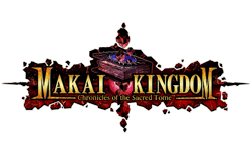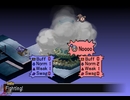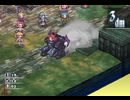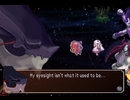|
|

|
PLATFORM
|
PS2
|
BATTLE SYSTEM
|

|
INTERACTION
|

|
ORIGINALITY
|

|
STORY
|

|
MUSIC & SOUND
|

|
VISUALS
|

|
CHALLENGE
|
Unbalanced
|
COMPLETION TIME
|
20-40 Hours
|
|
OVERALL

|
+ Lots of customization.
+ Music is alright.
- Lopsided, sometimes vague, mechanisms.
- Character management can be a nightmare.
- Underdeveloped plot.
- Recycled graphics.
|
Click here for scoring definitions
|
|
|
An Overlord named Zetta wishes to prevent the destruction of his world as predicted by Pram the Oracle. After discovering the Sacred Tome, he finds a passage saying his own stupidity would be the downfall of his Netherworld. Angry, he burns the book, afterward recalling that destroying it would also destroy his world. Thus, he confines his soul to the Sacred Tome and lets other Overlords recreate his world by writing in the Tome's pages. Nippon Ichi's Phantom Kingdom, oddly renamed Makai Kingdom: Chronicles of the Sacred Tome in North America, continues the company's tradition of deep, quirky tactical RPGs. Makai Kingdom attempts to hybrid elements from previous N1 games such as Disgaea and Phantom Brave, though the result is something of a Frankenstein's Monster.
As with N1's other tactical RPGs, Makai Kingdom is divided into several chapters. At the start of each, the player can choose one of several Overlords to help rebuild Zetta's Netherworld, having some effect on the size, enemy number, and enemy type of each map. Between battles, the player performs several tasks in a hub town, such as shopping for new gear, healing characters, creating new allies (which requires the player to “confine” them to an item for stat bonuses and/or penalties), and so forth. Going to the next battle is a matter of going to the portal and choosing the newest map, with players also able to revisit completed areas.
Battles begin with Zetta, in book form, on the map along with several enemies, with the player and the enemy having separate turn sessions akin to Disgaea. Zetta, being a book, naturally can't fight, although he can use the Invite command to bring characters created in the hub town onto the map. Characters have a number of options, such as freely roaming the map in circular ranges and performing one of several special skills, some requiring SP, and others, like normal attacks, requiring none. Once the player has inputted character commands, he/she can select the Execute option to have them naturally execute their attacks.
Attacks against the same enemy can string together into combos, as long as they don't push the enemy around, and if an enemy is forced out of range thanks to an attack or dies before other characters' turns to attack, then those characters' commands will be wasted, so in many instances inputting and executing one ally's attack at a time is preferable. The player can deploy up to eight characters (and three facilities) on the field, and once they've done everything they can do in a round, they can end their turn and allow the enemies to make their moves.
 The player can fight enemies in their own facilities.
The player can fight enemies in their own facilities.
|
|
Instead of making players defeat all enemies to win a map, Makai Kingdom requires the player to obtain a certain score before they can complete it, with defeating enemies and destroying other objects occasionally littering the map netting the player a certain amount of points. Once the player has reached the necessary amount of points, they receive the option of ending the battle or continuing until satisfied. After the battle, the player will receive a special bonus per hundred points earned (up to a thousand), such as a piece of equipment, a consumable item, some extra money, extra experience for all characters on the map, and so forth.
Plenty of other features figure into the battle system, such as Zetta's ability to invite facilities and vehicles onto the map. The player begins the game with a few default facilities into which they can place several allies, with certain facilities having bonus effects such as increased attack or defense power and fixed healing after a round. Characters can create new facilities with Mana gained from killing enemies (alongside experience for standard leveling), although doing so will in most instances kill the builder, although it is possible to reincarnate characters that die like this into new bodies, with some stat bonuses as they level. Characters that are confined to items with stars by their names can also reincarnate normally with Mana.
The player occasionally gains vehicles as a reward for winning battles, with the player able to equip them like characters, though vehicles also require a character to work it, with the pilot affecting the vehicle's stats, as well. Players can invite vehicles onto the map just like characters and facilities, although it is possible to place them into facilities and withdraw them. If a character has not executed a command in a round, the player can move him/her back into a facility, allowing the player to replace him/her with another character. Vehicles and their pilot each count as one character, and if their vehicle is destroyed, their pilots can still fight normally. It is possible to buy new equipment for vehicles and level them up through the use of MT, occasionally gained as a reward for winning a stage.
In an interesting twist, a character or item on the current map may serve as a "key," which, when defeated, will cause an extension map to append to the initial map, bearing more enemies and occasional field items, often necessary to obtain the score needed to complete a stage. Extensions are randomly-generated (although the initial map of each stage may be fixed), and may have rare effects when revealed such as putting everyone on the map to sleep or depleting everyone's HP. Characters can also throw their current weapon (and pick up another weapon or item on the map if available) off a particular edge to reveal an extension, if no key is available.
 Sometimes, enemies in vehicles can be brought down easily by characters on foot.
Sometimes, enemies in vehicles can be brought down easily by characters on foot.
|
|
If the player needs to level up, they can revisit beaten maps, or characters can use Mana to create ironically-named Free Dungeons, with a number of floors based on their creator's level (but no more than a hundred floors). Once the player begins a Free Dungeon, they cannot exit unless they complete all its floors or use a special item (somewhat rare, but more common as rewards for completing various stages of Free Dungeons). To use them and other consumable items, the player must put either put them in a facility or have a character hold it and simply use it.
All in all, combat has plenty of good ideas, though the fusion of elements from Disgaea and Phantom Brave doesn't always work out, especially since the difficulty is lopsided at times; sometimes, the player will simply breeze through stages, and other times, a lot of leveling may be necessary to advance. The heavy degree of randomization certainly won't appeal to everyone, either, and the translation in a minor way affects combat; for instance, morningstar-type weapons are incorrectly labeled as hammers. Some of the mechanisms are also vaguely explained, and a guide may be necessary at times to make the most of combat. Ultimately, combat is in many ways a driving factor, but often a deterrent, as well.
Interaction, though, poses a greater burden much like in Nippon Ichi's other games. While the menus are superficially efficient, managing characters, facilities, vehicles, and so forth can be an absolute nightmare, given the lack of an equip-best option, alongside other annoyances such as the need to unequip characters and take them out of facilities for them to reincarnate or build facilities, something the game itself could have automatically done. Moreover, when shopping, the player cannot "fit" prospective equipment on a character or vehicle, and instead must go through the menus, view the stats of their current gear, and remember them when shopping. In the end, if combat doesn't turn players off, the interface will certainly do the trick.
As mentioned, Makai Kingdom fuses elements from Disgaea, such as dozens of different classes and higher class ranks alongside character reincarnation, and Phantom Brave, such as the ability to confine new characters to items (without fear of them vanishing during battle unlike in that game) and gridless field movement, although it features plenty of new elements such as facilities, vehicles, and the score system, to keep it sufficiently fresh.
 Of course, being in outer space doesn't help.
Of course, being in outer space doesn't help.
|
|
The story, however, is one of the game's nadirs, given the scarcity of cutscenes in each chapter, along with the sluggish pacing, given that most scenes come at the beginning and end of chapters. The plot itself really isn't all that spectacular, given the relative lack of development, although the ending is sufficiently lengthy, and the game has a slight sense of humor at times. Still, unlike in most other tactical RPGs, the plot really isn't that much of a driving factor.
The soundtrack, however, is more passable, with Nippon Ichi composer Tenpei Sato this time teaming up with several other composers, and the results being somewhat better than in the company's other titles. Many battle themes are energetic and at times catchy, though the variety of the music is somewhat lacking at times. The English voicework is also mostly an amateurish effort, and in the end, while the aurals don't shine all that well, they're by no means a deterrent.
As with the company's other titles, moreover, Makai Kingdom uses two-dimensional sprites and three-dimensional scenery, along with occasional static art during story scenes. The combination by no means hurts the game, though Makai Kingdom really doesn't do much to distinguish itself visually from Nippon Ichi's other titles, and considering that other Playstation 2 tactical RPGs such as Stella Deus look significantly better, the developers could have definitely done more to make the game look more at home on the system. Overall, the graphics aren't so much as bad as they are dated.
Finally, the game can be long or short depending on how well the player grasps its mechanisms, somewhere from twenty to forty hours, with a replay mode available to boost playing time even more. In conclusion, while Makai Kingdom attempts to fuse supposedly-good gameplay elements from its immediate predecessors, Phantom Brave and Disgaea, this combination doesn't always work to the game's favor, given the vagueness of some of the new mechanisms along with the title's lopsided difficulty. It definitely has its moments, but can sometimes feel like a retread for those experienced in Nippon Ichi's other titles.
Review Archives
|









